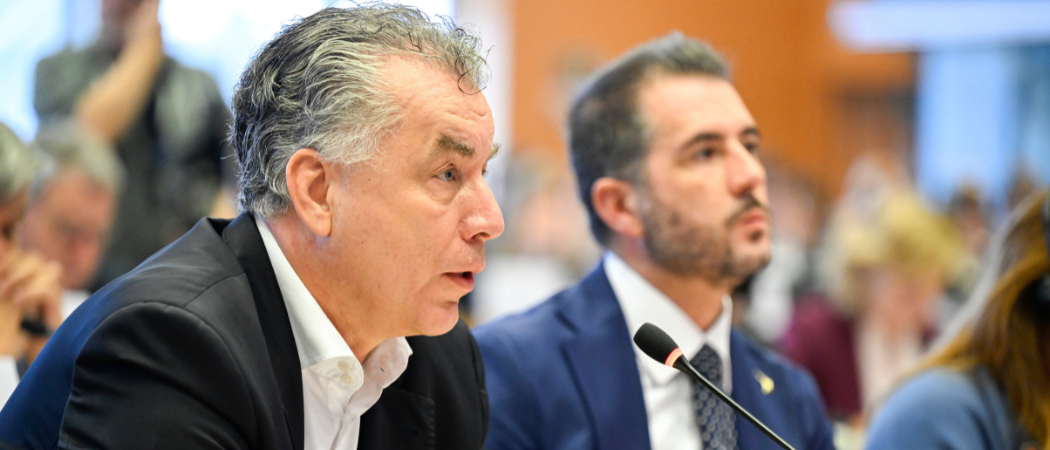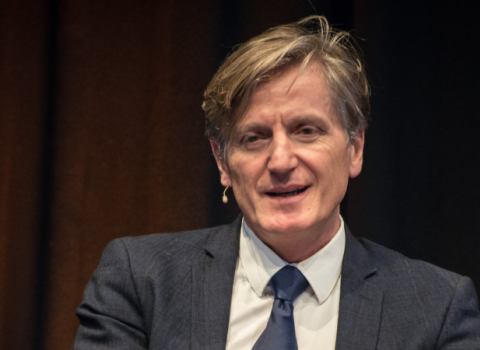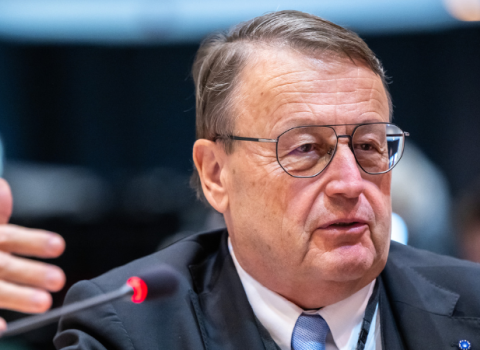MEPs have submitted amendments to an ITRE report, including a recommendation to rethink the European Institute of Innovation & Technology

MEP Christian Ehler at the confirmation hearing of Ekaterina Zaharieva, the new Commissioner for Start-ups, Research and Innovation. Photo credits: Laurie Dieffembacq / European Union
Some members of the European Parliament Committee on Industry, Research, and Energy (ITRE) are calling for a “reform and refocus” of the European Institute of Innovation and Technology (EIT) in amendments to a draft report presented Christian Ehler MEP on 5 December.
Ehler’s amendments to the draft, which were supported by several EPP colleagues, include a recommendation to restructure EIT and fund it through the European Research Area (ERA) in the next research programme, FP10.
However, some MEPs are against changes to EIT. “I believe the EIT can play an important role in bridging the geographical innovation gap,” said Lina Gálvez Muñoz, Spanish member of the ITRE committee.
Gálvez has submitted a couple of amendments to the draft report highlighting EIT’s contribution to reducing the European innovation capacity divide and closing the skills gap between higher education and business.
EIT launched in 2008 to focus on spawning the formation of innovation ecosystems and accelerating the deployment of products and services in fields including green technologies and healthcare. It has nine knowledge and innovation communities (KICs), that bring together business, education, and research partners to address specific challenges. Via the KICs, EIT has a local presence in every member state – especially in eastern Europe.
Ehler told Science|Business that EIT needs to be reformed so the central management at the headquarters in Budapest adds less complexity to the KICs.
“The value of the EIT is created in the KICs so (…) it should be identified what the role of the central office has to be in the future, where it adds value and where it adds complexity,” Ehler said. “This is something to develop in detail in the EIT Regulation rather than the FP10 proposal.”
In the past year, pressure has mounted around calls to revamp EIT or merge parts of it with the European Innovation Council (EIC) in FP10, because EIT’s activities overlap with other initiatives or programmes.
“For many stakeholders, the financial and other costs of participating in a KIC are outweighed by the high bureaucratic burden for relatively little funding support,” the ITRE draft report says.
That would appear to be at odds with the fact that EIT has been recently named as the top investor in the most promising start-ups of 2024 by the tech newsletter Sifted, and identified by the Innovative Europe study released by the European Commission as one of the most efficient in ‘time-to-grant’ under Horizon Europe, as an EIT spokesperson pointed out to Science|Business.
Ehler response is that these accolades do not reflect the performance of the EIT central office, but rather reinforce that the value of the EIT is in the KICs.
While the time-to-grant performance is efficient, this metric doesn't reflect the challenges faced by stakeholders in managing grants for specific projects, which are seen as complex and problematic, Ehler noted.
As one case in point, in May Germany’s Fraunhofer-Gesellschaft, one of the world’s leading applied research organisations, released a paper arguing EIT is “overly complex, costly and non-transparent” and should be “discontinued”. It also criticised the high administrative burden of participating in EIT activities, and a lack of involvement of universities and research institutes.
Fifth freedom
A total of 359 amendments have been submitted to the draft report, including 60 from Ehler. Among them is a proposal inspired by former Italian prime minister Enrico Letta, advocating for the development of a ‘Fifth Freedom’ for research within the Single Market.
In another of Ehler’s amendments, he emphasised the importance of international cooperation to advance science within the Framework Programmes, noting that such collaboration has declined in Horizon Europe compared to its predecessor, Horizon 2020. He urged the European Commission to finalise additional association agreements to Horizon Europe with third countries, to enhance the EU’s competitiveness.
He stressed in particular the importance of the association of the UK to Horizon Europe, and expressed regret that “Switzerland and the Union have not yet agreed on a general framework for cooperation.”
Disagreements remain on some other issues, including the draft report's proposal to significantly cut most of the research Missions in Horizon Europe. Some MEPs argue instead for improving their implementation rather than reducing their number.
Some MEPs also put forward amendments questioning Ehler’s proposal to allocate half of the FP10 budget to the European Research Council (ERC) and the EIC. The discussion was also raised during an ITRE meeting, when it was pointed out that this could lead to cuts in pre-competitive research and innovation projects.
Despite differing views on some aspects, MEPs appear to broadly agree on several key objectives outlined in the draft report. These include increasing public and private R&D expenditure to at least 3% of member states’ GDP, cutting red tape in FP10, and addressing the EU RD&I gap with China and the US.
Negotiations for a final ITRE report on FP10 will continue until early next year, with the vote in ITRE expected on February 20. The final adoption in a plenary session should be in March.
As MEPs and stakeholders continue to call for an increase in the FP10 budget to at least €200 billion, the future of a standalone research Framework Programme remains uncertain. The European Commission is making moves to bundle all research and innovation funds into a new mega competitiveness fund that would be launched under the new multiannual budget (MFF) that is due to start in 2028.
In Strasbourg on Wednesday, the rapporteurs of the European Parliament for the post-2027 long-term EU budget, Siegfried Mureşan and Carla Tavares, outlined their key priorities, including simplification by reducing bureaucracy, harmonising eligibility criteria across programmes, enhancing flexibility, and merging smaller programmes.
When asked by Science|Business if the Parliament would support the Commission’s proposal to consolidate all research and innovation funds into a single competitiveness fund, Mureşan said that a one-size-fits-all approach is not an answer for everything.
He emphasised the need for targeted funding tailored to researchers’ specific needs, particularly excellence-driven initiatives.
“Different types of beneficiaries need different funds,” said. “We will advocate for a continuation of specific funding to researchers.”
The Parliament aims to have an initial draft of the MFF ready by the end of January 2025, with plenary discussions expected in April or May. Meanwhile, the European Commission is supposed to present its proposal for the next MFF around mid-2025.





 A unique international forum for public research organisations and companies to connect their external engagement with strategic interests around their R&D system.
A unique international forum for public research organisations and companies to connect their external engagement with strategic interests around their R&D system.